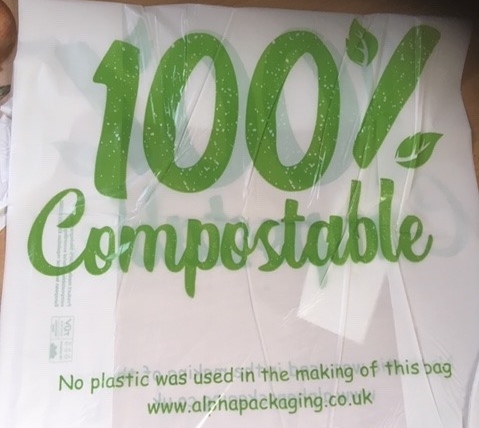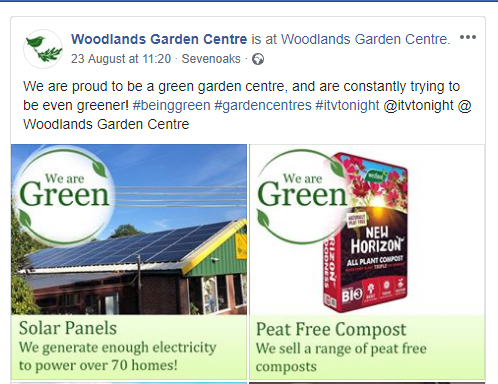
Garden industry figures have retaliated to criticism voiced in an ITV investigation screened last week that garden centres are “not as green as people believe”.
The ITV Tonight programme, ‘The Trouble with Garden Centres…’ presented by Chris Choi, the consumer editor of ITV News, suggested the industry was not doing enough to meet the government’s targets on eliminating the use of peat, encourage the recycling of plastic plant pots or cutting the risk of pests and diseases from plant imports.
The programme makers have in turn been accused of a simplistic one-sided approach that failed to highlight the complex issues involved or to recognise the industry’s increasingly positive contribution to the environment.
Former GCA standards inspector Roger Crookes said in a Facebook post: “There is nothing like balanced reporting - and that was nothing like balanced reporting.”
He told GTN Xtra: “It would have been more balanced if they had shown more of what the independent garden centres and smaller groups are doing to become increasingly environmentally friendly.
Chris Choi said the “industrial scale” harvesting of peat in Ireland was destroying a treasured eco-system as garden centres continued to sell peat-based compost. The programme then interviewed some allotmenteers in the north of England who said they grew crops in peat-based composts on their plots – a practice regarded as unrepresentative amongst most experienced gardeners.
Crookes, a former garden centre operator, told GTN Xtra that the majority of growing media purchases were for use in containers and baskets and not for digging into the soil, for which other non-peat materials were more appropriate. “We need to be responsible and realistic in our approach and continue to develop more 'green composts' which perform really well for the ever growing [numbers of] container gardening consumers,” he added.
The programme highlighted the lack of a standard approach to labelling on bags of compost, making it difficult for consumers to judge whether or not they contained peat and how much of it.
Interviewed by the presenter, HTA chairman James Barnes admitted the industry would “find it difficult” to hit the government’s 2020 target for the removal of peat from bagged composts but said peat content had been reduced to 56% across all growing media. He also said the industry’s new Responsible Sourcing Scheme, which could be in operation by next year, would result in more effective labelling.
Steve Harper, chair of the Responsible Sourcing Scheme (RSS), which is being developed with input from retailers and consumers as well as manufacturers, described the ITV programme as “slightly sensationalist”.
He said the RSS was the right approach towards a realistic solution of the peat debate. “We do not yet fully understand the carbon footprint issue of peat or all the other materials used in growing media, “ he told GTN Xtra.
“For example, what are the implications of washed coir from faraway countries that do not have enough drinkable water?
“Cost is another factor. I accept peat has always been the cheapest material but if we were to remove it entirely, how many of the people interviewed on the programme would currently be prepared to pay three, four or five times as much for their compost?
“Then there is the question of the availability of raw material – there would not be enough to meet current demand [if we were to remove peat]. And we can’t access coir in the monsoon season, when it can’t be harvested and dried.”
He also said the nutrient-rich nature of green waste meant it could only constitute 20% of a peat-free compost. There was added competition from the biomass fuels industry for materials like UK timber waste.
The RSS, currently nearing the review stage, will audit the environmental impact of all growing media components and award scores, which will appear on bag labelling.
Overall, said Harper, most consumers do no understand the peat issue. He believed the move towards peat-free is being driven solely by government targets rather than consumer demand.
Meanwhile, Westland Horticulture, the UK’s biggest producer of growing media for gardeners, says its New Horizon peat-free range, re-launched a year, ago has enjoyed outstanding success.
It claims it has increased non-peat content of its growing media from 38% to more than 70% over the past 10 years and says the new version of its top-selling Multi-Purpose with John Innes will be ““the most significant step in reducing peat consumption across the whole industry in 2020”.
Kith Nicholson told GTN Xtra: "It's great to see that the TV companies are highlighting the success and growth in the garden retailing sector, and profiling the work being done to further the industry.
"However, the programme lacked the science and research to show the work really going on in the industry to truly inform viewers and give a balanced argument.
"If approached for comment, we would have highlighted the considerable work we have put into reducing peat in our growing media and the substantial investment in R & D to launch of our new generation, high performance peat-free compost, New Horizon containing the peat alternative BIO3. Now over 70% of total material used in Westland products is non peat which will be furthered in 2020, headlined by the our move to reduce peat content in the UK’s lead compost, Multi-Purpose with John Innes - Single biggest step in driving the industries peat reduction.
"We have also already achieved “zero to landfill” in all our facilities and have removed over 800 tonnes of plastic from our product packaging, including growing media.
"Gardening, by its very nature, is a green and very positive sector for the environment and social wellbeing. Westland will continue to support change and work with garden centres to deliver a strong and sustainable future for all gardeners.
Trevor Pfeiffer, MD of Garden Trade News, told GTN Bestsellers readers last week that the ITV Tonight programme was typical of consumerist TV that failed to give a balanced perspective. “Surely some mention should have been made about the benefit garden centres bring by enabling the nation’s gardeners to grow plants that have such a positive environmental and emotional benefit to society as a whole,” he said. “The programme did not throw up any issues we are unaware of. They are issues that, as an industry, we are all concerned about and working towards finding solutions and improvements for.”

On facebook on Friday we found posts from two garden centres who are already working positively with eco issues: Alban Hill Nurseries in Newport Pagnell (above) and Woodlands Garden centre in Kent (below). It's a shame the ITV researchers didn't take their film crews there or to the likes of Coolings or Ayletts where along with so many other garden centres plenty of good work is in action every day.
